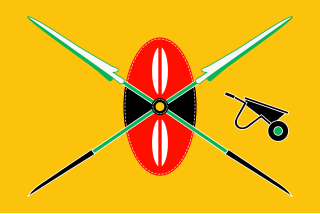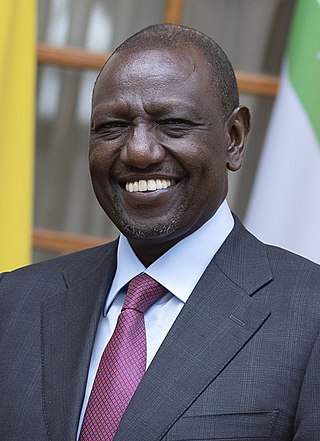
A part of Eastern Africa, the territory of what is known as Kenya has seen human habitation since the beginning of the Lower Paleolithic. The Bantu expansion from a West African centre of dispersal reached the area by the 1st millennium AD. With the borders of the modern state at the crossroads of the Bantu, Nilo-Saharan and Afro-Asiatic ethno-linguistic areas of Africa, Kenya is a truly multi-ethnic state. The Wanga Kingdom was formally establsihed in the late 17th century. The kingdom covered from the Jinja in Uganda to Naivasha in the East of Kenya. This is the first time the Wanga people and Luhya tribe were united and led by a centralized leader, a king, known as the Nabongo.

Daniel Toroitich arap Moi was a Kenyan politician who served as the second president of Kenya from 1978 to 2002. He is the country's longest-serving president to date. Moi previously served as the third vice president of Kenya from 1967 to 1978 under President Jomo Kenyatta, becoming the president following the latter's death.

The Kenya African National Union (KANU) is a Kenyan political party that ruled for nearly 40 years after Kenya's independence from British colonial rule in 1963 until its electoral loss in 2002. It was known as Kenya African Union (KAU) from 1944 but due to pressure from the colonial government, KAU changed its name to Kenya African Study Union (KASU) mainly because all political parties were banned in 1939 following the start of the Second World War. In 1946 KASU rebranded itself into KAU following the resignation of Harry Thuku as president due to internal differences between the moderates who wanted peaceful negotiations and the militants who wanted to use force, the latter forming the Aanake a forty, which later became the Mau Mau. His post was then occupied by James Gichuru, who stepped down for Jomo Kenyatta in 1947 as president of KAU. The KAU was banned by the colonial government from 1952 to 1960. It was re-established by James Gichuru in 1960 and renamed KANU on 14 May 1960 after a merger with Tom Mboya's Kenya Independence Movement.

Emilio Mwai Kibaki was a Kenyan politician who served as the third President of Kenya from December 2002 until April 2013.

The president of the Republic of Kenya is the head of state and head of government of the Republic of Kenya. The president is also the head of the executive branch of the Government of Kenya and is the commander-in-chief of the Kenya Defence Forces. The country's current president is William Ruto since 13 September 2022.

The Kenya African Democratic Union (KADU) was a political party in Kenya. It was founded in 1960 when several leading politicians refused to join Jomo Kenyatta's Kenya African National Union (KANU). It was led by Ronald Ngala who was joined by Moi's Kalenjin Political Alliance, the Masai United Front, the Kenya African Peoples Party, the Coast African Political Union, Masinde Muliro's Baluhya Political Union and the Somali National Front. The separate tribal organisations were to retain their identity and so, from the very start, KADU based its political approach on tribalism. KADU's aim was to defend the interests of the so-called KAMATUSA as well as the British settlers, against the imagined future dominance of the larger Luo and Kikuyu that comprised the majority of KANU's membership, when it became inevitable that Kenya will achieve its independence. The KADU objective was to work towards a multiracial self government within the existing colonial political system. After release of Jomo Kenyatta, KADU was becoming increasingly popular with European settlers and, on the whole, repudiated Kenyatta's leadership. KADU's plan at Lancaster meetings was devised by European supporters, essentially to protect prevailing British settlers land rights.

Stephen Kalonzo Musyoka is a Kenyan politician who was the tenth Vice-President of Kenya from 2008 to 2013. Musyoka served in the government under the late President Daniel arap Moi as the Secretary of Kenya African National Union party (1980-1988), Assistant Minister for Works (1986-1988), Deputy Speaker of the National Assembly (1988-1992), Minister for Foreign Affairs from 1993 until 1998, Minister of Education (1998-2001); and subsequently, under the late President Mwai Kibaki, he was Minister of Foreign Affairs again from 2003 to 2004, then Minister of the Environment from 2004 to 2005. He was an unsuccessful candidate in the 2007 presidential election, after which he was appointed vice-president by Kibaki in January 2008.
The Gikuyu, Embu, Meru Association (GEMA) is an organisation in Kenya created to presumably advance the social and political needs of the Eastern Kenya Bantu people of Gikuyu, Embu, and Meru who though are closely related linguistically and culturally but don't have common mythologies or history. It was founded in 1971, with an economic arm, GEMA Holdings.
Kenneth Stanley Njindo Matiba was a Kenyan politician and an activist for democracy. He came in at second place in the 1992 presidential election. In November 2007, he announced that he would stand as a presidential candidate in the December 2007 election. Matiba placed seventh, with 8,046 votes.

William Kipchirchir Samoei arap Ruto is a Kenyan politician who is the fifth and current president of Kenya since 13 September 2022. Prior to becoming president, he served as the first elected deputy president of Kenya from 2013 to 2022. Previously, holders of the position were referred to as Vice President and the officeholder was unelected and appointed by the President. He previously served in three cabinet portfolios as the Minister for Home Affairs, the Minister of Agriculture and as Minister for Higher Education.

Raila Amolo Odinga is a Kenyan politician who was the prime minister of Kenya from 2008 to 2013. He was the Member of Parliament (MP) for Langata Constituency from 1992 to 2013 and has been the Leader of Opposition in Kenya since 2013. He is the leader of Azimio la Umoja–One Kenya Coalition Party.

George Musengi Saitoti, E.G.H. was a Kenyan politician, businessman and American- and British-trained economist, mathematician and development policy thinker.

John Njoroge Michuki was a Kenyan politician and businessman. He was born at Muguru, village, Iyego Location, Kangema Division in Murang’a District. He was educated in Kenya and abroad. Michuki emerged as one of the prominent and long-serving civil servants and politicians as well as a businessman in Kenya. Michuki served Kenya in various capacities, including Permanent Secretary in the Finance Ministry, Chairman of the Kenya Commercial Bank, Member of Parliament and Cabinet Minister. He was serving his 4th five-year term as a Member of Parliament for Kangema Constituency. Michuki had a reputation as a "ruthless" and efficient manager, and was widely acknowledged as among the best performing ministers in President Kibaki's Government. He was serving as the Minister for Environment and National Resources at the time of his death.
Koigi wa Wamwere is a Kenyan politician, human rights activist, journalist and writer. Koigi became famous for opposing both the Jomo Kenyatta and Daniel arap Moi regimes, both of whom sent him to detention.

General elections were held in Kenya on 27 December 2002. Voters elected the President, and members of the National Assembly. They coincided with the 2002 Kenyan local elections.

General elections were held in Kenya on 27 December 2007. Voters elected the President, and members of the National Assembly. They coincided with the 2007 Kenyan local elections.

Majimbo is a Swahili term that is commonly used in Kenya to refer to the idea of political devolution of power to the country's regions. It is alleged by critics, including former vice-president Oginga Odinga in his book Not Yet Uhuru, to have been coined by European settlers in Kenya's White Highlands region, around the time of independence in 1963, who preferred to retain an autonomous, ethnically based governance over the region. It has also been alleged, by some of its critics, that majimbo is a pretext for the type of communal violence that has plagued Kenya's elections especially since the return of multiparty politics. In his autobiography Illusions of Power, G.G Kariuki, a long serving KANU Member of Parliament, goes as far as to allege the existence of a plot to instigate communal violence in Kenya's independence elections by supporters of a Majimbo system of government.
James Nyamweya was a Kenyan politician who served in ministerial, parastatal, and political party leadership positions in both the Kenyatta and Moi governments from 1965 to 1995. He was Parliamentary Secretary in the Ministry of Justice and Constitutional Affairs, Assistant Minister in the Office of the President, Minister of State in charge of External Affairs Foreign Minister, Minister of State in charge of Provincial Administration, Leader of Government Business in Parliament, Minister for Works, Minister for Power and Communication, Minister for Labour, Chairman Electoral Boundaries Commission, and National Vice Chairman of the Democratic Party.

James Njenga Karume was a Kenyan businessman and politician. He was born in Elementaita, Nakuru District.
The Truth, Justice and Reconciliation Commission of Kenya (TJRC) was established in 2008. Kenya’s modern history has been marked not only by liberation struggles but also by ethnic conflicts, semi-despotic regimes, marginalization and political violence, including the coup d'état of 1982, the Shifta War, and the 2007 Post-election violence.
"Constitutional Law According to Mr. Justice Dugdale" Nairobi Law Monthly, 34 (19910: 15-16).















